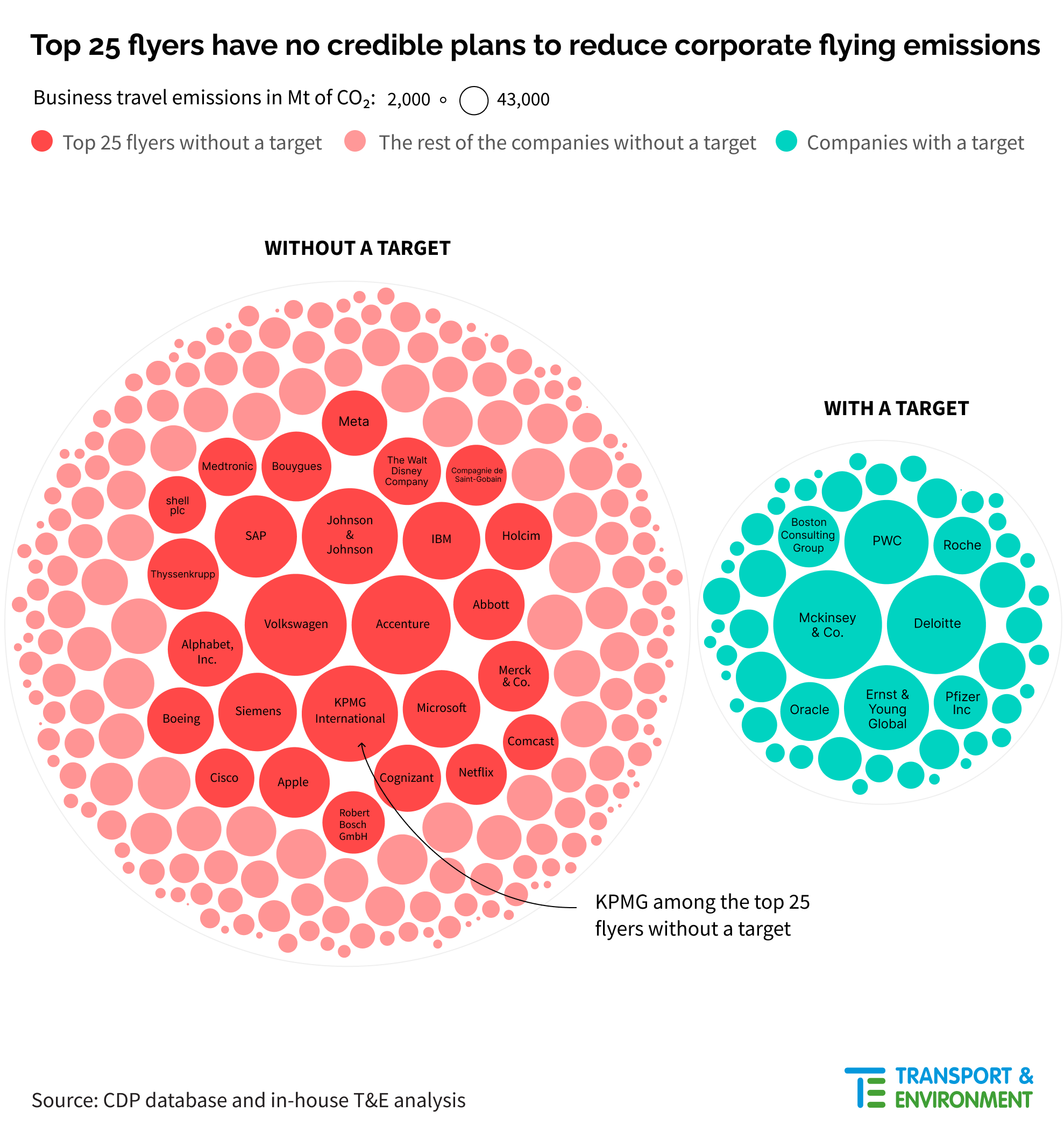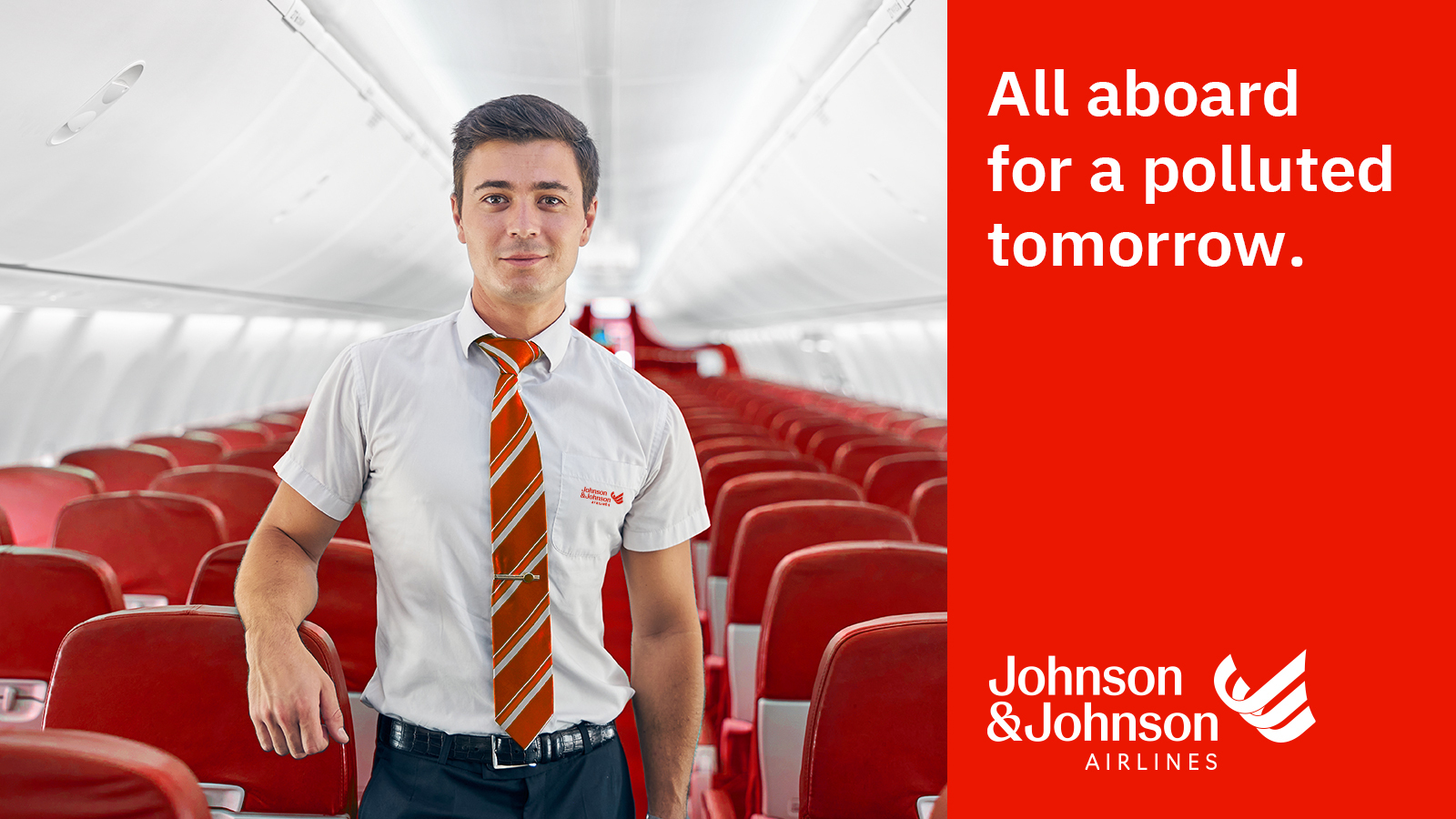Top flyers not making credible plans to reduce corporate flying
Twenty five companies have been singled out in the latest edition of the Travel Smart Ranking, which assesses the efforts and commitments made by multinationals to reduce business travel by air. They are considered poor performers on the basis of two criteria: 1) high CO2 emissions due to employee air travel; 2) no credible targets to reduce these emissions, despite often promoting their green credentials. These 25 multinationals are responsible for 36% of business travel emissions recorded in the ranking.
The analysis shows that if just these top 25 flyers cut their business flying in half, it would achieve a third of the emissions reductions needed by 2025 from the 328 companies in the ranking[1]. The 5.9 Mt of CO2 saved would be equivalent to the emissions produced by 3 million cars in a year.

The analysis shows a stark juxtaposition between companies in the same industry – with ambitious companies setting targets and laggard companies refusing to do so year after year. Among the top flyers without targets are consulting giants KPMG and Accenture. On the other hand, peers EY, PwC and Deloitte are much more ambitious, with plans to reduce what is often regarded as ‘the low hanging fruit’ of a company’s climate footprint.
By not setting targets, the two consulting giants risk quickly rebounding to pre-COVID levels of flying. A tracker of companies’ emissions published last year showed that companies that don’t set targets like Johnson & Johnson and Merck have already bounced back close to their 2019 levels of corporate travel, at only -28% and -17% respectively in 2022.
Other top flyers in the ranking with no credible plans to cut down travel emissions include Siemens, Volkswagen, Johnson & Johnson and Google. These global companies consider themselves progressive and pioneering businesses yet fail to tackle air travel emissions. To highlight the worst offenders, the Travel Smart campaign has launched fake airlines, such as Siemens Airlines, IBM Business Airlines and Johnson & Johnson Airlines, drawing attention to their higher share of responsibility when it comes to reducing corporate flights. For instance, Siemens’ business travel emissions in 2019 of 0.31 Mt of CO2 were equivalent to the carbon footprint of close to two daily flights for a whole year from London to New York.


“Top flyers have an outsized responsibility to cut down their flying. They must urgently set targets or risk losing out to competitors. There are no excuses for not taking action. Peers in their sector have set ambitious targets, so what is stopping laggards like KPMG and Accenture from doing the same?”, Denise Auclair, corporate travel manager at Transport & Environment explains.
Michael Solomon Williams, from charity Campaign for Better Transport, said: “Big business has a duty to reduce its impact on the planet. As this ranking reveals, some companies are leading the way when it comes to reducing their travel emissions whilst others are getting left behind. Rather than paying lip service to reducing their impact on the environment, companies need to set robust targets and deliver reductions for the sake of people and the planet.”
Lack of targets: companies misaligned with own green pledges
Of the 328 companies evaluated in the ranking, only 57 companies have set targets to reduce business travel emissions. 44 companies report the full climate impact of their travel (this includes non-CO2 emissions) – up from 40 last year. Many companies are on the record saying they will reduce emissions in line with the Paris Agreement. Yet, only seven additional companies have adopted targets since last year. This is a worrying sign that a majority of companies aren’t acting fast enough or demonstrating genuine commitment to reduce air travel emissions.
For a third year in a row, Google, Microsoft and Johnson & Johnson showed their reluctance to set a target and act on it, receiving a C or D grade. In this category, you can also find pharmaceutical giant GSK, Danone and Unilever in the food and agriculture sector, GE in the manufacturing sector and Amazon and Walmart in the retail sector.
16 companies in the ranking have been awarded the top category A, five more than in 2023. These include Pfizer, AstraZeneca and software company Oracle. This shows that businesses can make innovative changes and set ambitious targets by adopting new ways of working, replacing air travel with alternative modes of transport or through more virtual collaboration.
“Years after the corporate world learnt to connect and collaborate with fewer flights, many companies are yet to lift a finger to act on the climate footprint of their business flying. It is imperative that companies set tangible goals and binding commitments to achieve lower levels of business flying. Without these concerted actions, net zero pledges will simply become empty words,” says Florence Long, from the Aviation Environment Federation.
Note to editors:
The Travel Smart Ranking ranks 328 US, European and Indian companies according to 11 indicators, relating to air travel emissions, reduction targets and reporting. Companies are given an A, B, C or D grade. In this year’s edition of the ranking, 16 companies qualified for an A grade, 40 a B, whilst the overwhelming majority received a C (230) and 42 companies saw a D grade next to their name. This is the third edition of the ranking.
This ranking covers corporate flying, which is key to reducing emissions and to the future of sustainable aviation. Broader aspects of a company’s business model should also be addressed for it to be considered a leader in sustainability.
[1] The Travel Smart campaign asks companies to set targets of at least 50% reduction, by 2025 or sooner. The goal has been established based upon the rigorous analysis in Transport & Environment’s Roadmap to climate neutral aviation showing that a 50% reduction in overall business travel is needed during this decade, in order to keep aviation within a 1.5°C-compatible pathway.


